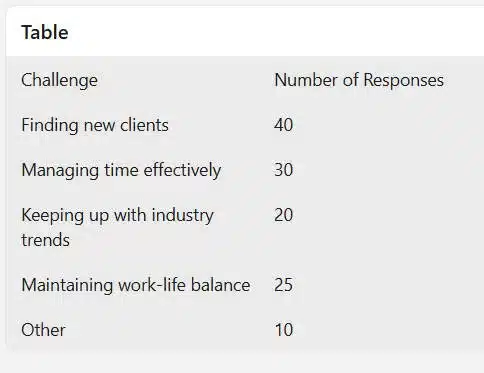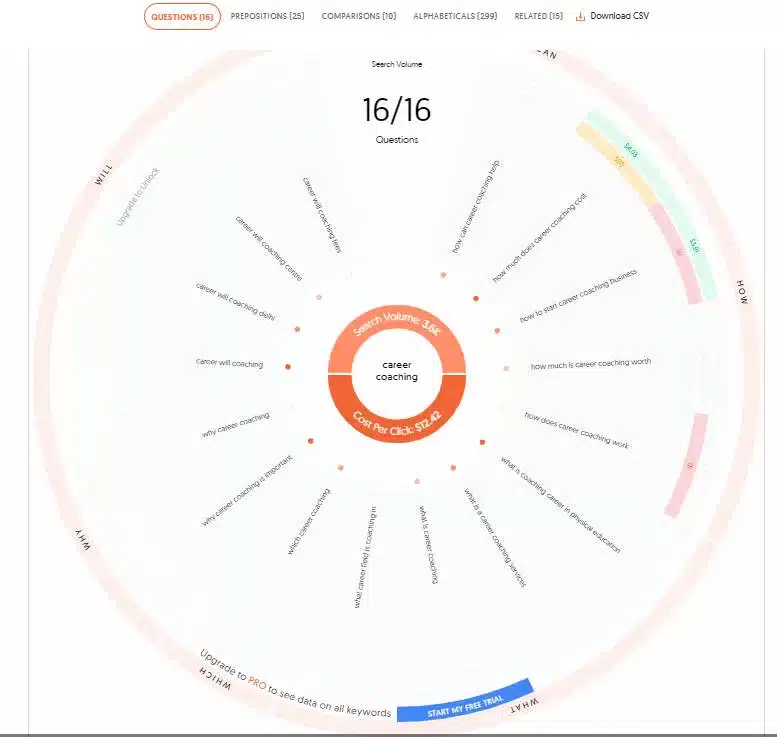Do you want to know how to get copywriting clients faster than a squirrel on roller skates?
That’s what this post is about.
Making a focused decision and sticking with it.
In my last lesson, I wrote about discovering your niche or area of specialization. I hope you took the time to read it and do the work I suggested.
In this lesson, we’re going to get focused like a laser and narrow down your area of specialization even more.
This shortcut will make getting clients so much faster, easier, and cheaper, you won’t believe it.
Let’s dive in…
How Not to Start Looking for Clients
Let me tell you how not to start looking for clients because I’m an expert at doing it the wrong way.
Years ago, when I first started freelancing, I was the superhero “Everyman.”
My superpower was writing any kind of copy for any kind of business. I ignored my mentors’ advice and got impatient because I wanted to write for anyone who had the money.
Boy, did I mess up.
So, wearing my tattered superhero cape, I jumped onto the Internet and started pitching.
I went on all the places you could find work, like Upwork, Fiverr, and even Craigslist. I pitched to anyone who needed a copywriter because I was Everyman!
And yes, I got gigs!
I wrote a direct response ad for some guys selling flip phones to Jewish people (not kidding). They also had a phone system that I wrote the entire manual for.
I crafted blog posts for military-based success coaches. crafted articles about blogging for bloggers. ghostwrote books for several business owners and even wrote whitepapers for cryptocurrency investors.
Yes, I was Everyman in the city of Copyville, and it SUCKED.

Why Being “Everyman” Sucked
Let me tell you why putting on this cape wasn’t a good idea.
First of all, generalists don’t earn much. To make good money, you need to specialize.
- I know a young lady who quit her medical career to become a welder. She loved it so much that she learned the most difficult kinds of welding joints and specializes in them. She makes over $200,000 a year doing this.
- Two specialized dentists who know how to fix teeth attached to a damaged jaw are now millionaires from this skill.
- Fixing electronic items doesn’t pay much unless you’re like two people I know who maintain and fix medical equipment. They have six-figure careers.
So, the point I’m making is: the more specialized you are, the more money you can make.

5 Reasons Why You Must Change Your Thinking
Finding your ideal client isn’t easy, but it’s super important. If you don’t do this, your copywriting business might fail.
As marketer Dan Kennedy says, “Marketing to everyone is marketing to no one.” You won’t succeed by trying to please everyone.
Here are some reasons why being a generalist (someone who tries to do everything) is bad for your business:
- Wasted Time and Money: You’ll spend a lot of time and money trying to market to all kinds of businesses. Your marketing will be confusing and expensive because you’ll be targeting too many different groups.
- No Specialization: You won’t become an expert in one area, where the real money is. Specialists make more money because they are experts. (Check out the niche article I wrote in the link above.)
- No Loyal Followers: You won’t build a group of loyal clients who need your services and products.
- Too Much to Learn: If you write for too many different products and services, you won’t be able to gain deep knowledge in any one area. This will drive you crazy.
- Less Money: Generalists don’t make as much money as specialists.
So let me say it one more time: to succeed, you need to focus on one specific type of client.
Do You Want to Get a Fast Jump Start on Getting Copywriting Clients?
Watch this video by Alex Hormozi:
Here’s How to Find Your Ideal Copywriting Clients
Step 1: Analyze Yourself
Here are some questions to ask yourself to help you find your favorite copywriting clients:
- What topics do I love?
Do I like writing about tech, health, money, fashion, etc.?
- Who have I enjoyed working with before?
Were they new businesses, big companies, charities, etc.?
- What projects do I like the most?
Do I prefer writing blog posts, emails, social media content, or something else?
- What am I good at?
Am I good at convincing people, telling stories, or explaining things?
- What work style suits me?
Do I like clients who give me freedom, or do I prefer clear rules?
- What are my career goals?
Is it important to be an expert in one area, or do I like variety?
- What values do I share with my clients?
Do I want to work with clients who care about the environment, innovation, community, etc.?
- What is my ideal client’s budget?
Think about how much money your clients can spend on your services. This will help you decide if they are a good fit for you.
- Am I looking for high-paying clients with big projects, or do I prefer smaller, frequent projects?
Decide if you want to work on big projects that pay a lot but take more time, or if you prefer smaller projects that come more often and keep you busy.
Take Time to Think
You need to take some time to think about these questions because you’ll be working in your chosen area a lot. The more you like your clients and enjoy your work, the better off you’ll be. Your work will shine, and you’ll produce higher quality work for them.
Step 2: Analyze Your Current Clients
(If you’re just starting out and don’t have any current clients, you can skip to Step 3.)
If you have current clients, you can get a lot of information from them to help you define your ideal client.
- Clear Communication
Clients who can clearly express their needs, goals, and expectations.
- Respect for Expertise
Do they value and trust your skills and knowledge as a copywriter?
- Timely Feedback
Will they provide prompt and constructive feedback to help you improve your work?
- Realistic Deadlines
Clients who set achievable deadlines and understand the time required to produce quality work.
- Collaborative Attitude
Are they open to collaboration and willing to work together to achieve the best results?
- Consistent Work
Clients who offer regular projects, providing a steady stream of work.
- Fair Compensation
Clients who pay fairly for your services and understand the value of your work.

Step 3: Think About Clients You Want to Work With
Now we are where the rubber meets the road. You can now focus on clients that you will be looking for. Take your time and think about these qualities because it will make your prospecting go so much easier.
- Location
Where do they live? (City, state, country) Are they in urban, suburban, or rural areas?
- Age
- What is their age range? (e.g., 25-40 years old)
- Gender
Are they male, female?
- Income Level
What is their annual income? (e.g., $50,000 – $100,000)
- Education Level
What is their highest level of education? (e.g., high school, college degree, master’s degree)
- Occupation
What do they do for a living? (e.g., business owner, marketing manager, freelancer)
- Marital Status
Are they single, married, divorced, or in a relationship?
- Family Status
Do they have children? If so, how many and what ages?
- Hobbies and Interests
What do they enjoy doing in their free time? (e.g., reading, traveling, sports)
- Technology Use
How tech-savvy are they? What devices do they use? (e.g., smartphones, tablets, laptops)
- Social Media Presence
Which social media platforms do they use? (e.g., Facebook, Instagram, LinkedIn)
- Buying Behavior
How do they prefer to shop? (e.g., online, in-store) What influences their purchasing decisions? (e.g., reviews, recommendations, price)
Nail Down These Points – It’ll Be Easier
The more of these points you can identify with your ideal client, the easier it will be to find them. Yes, it’s a lot of work at the beginning, but it’s worth it.
Hot Tip: No matter what kind of business you’re in—whether it’s copywriting, coaching, hairdressing, or anything else—you need a copy of the book Guerrilla Marketing In 30 Days and its workbook by Jay Conrad Levinson. (You can just get the workbook, and that would be enough to help you.)
These resources will help you identify and market to your ideal client with proven methods and strategies to help you succeed in your space.
Don’t Worry About Finding Copywriting Clients
I know what you’re thinking. You’re thinking, “Wow, this is a lot of work!” Yes, it is a lot of work at the beginning, but once you finish this part, you’ll know exactly who your ideal clients are.
You’ll save time, money, and frustration because you won’t be chasing every prospect that comes along. Your chances of landing clients will be much higher too.
Meet Your Ideal Copywriting Client With The Art of Deep-Dive Research
I have a friend who had a hard time finding copywriting clients.
Leslie found the whole process of approaching clients to be very confusing and somewhat degrading. She loved writing and had learned quite a bit about how to sell using words, but getting clients had eluded her for some reason.
However, she remembered some of the advice she had read online and from books she had purchased: “Know your ideal client inside and out.”
Since she wanted to start her copywriting career writing for personal development self-help coaches, Leslie knew she’d have to dig deeper into the psyche of her ideal clients.
“Who are my ideal clients?”
Immediately, she realized that she needed to get ultra-specific.
After all, there are a lot of different categories of coaches in the personal development arena. So, she decided to get even more up close and personal with the kind of person she was looking for.
The kind of success coach she wanted to approach were going to be younger females who were starting to experience a certain degree of success in their coaching business.
So far, her ideal clients were:
- Female
- Personal development / success coaches
- Younger – possessing energy and the drive to succeed
- They wanted to promote their ventures with email copywriting
- Experiencing success in their business
The last point was important to Leslie.
She did not want to approach people who did not have marketing money. She wanted someone who had the cash to pay her and understood the value of a professional copywriter.
But Leslie knew this wasn’t enough digging.
She had to go even deeper.
Getting to Know Your Ideal Client
Leslie knew that to really connect with her perfect clients and get copywriting clients, she needed to understand their needs well. Here are the ways she found out what her clients really wanted:
Watching YouTube Videos
Why YouTube?
YouTube has lots of videos about coaching and personal development. Leslie watched these videos and took notes. She focused on videos that talked about the problems personal development coaches face. She liked videos from successful coaches in her field.
These videos showed the pain points, struggles, and dreams of coaches. Many successful coaches have teams of marketers and copywriters. By studying their videos, Leslie learned what worked for them. It was like getting a behind-the-scenes look at their businesses.
Leslie found that the answers were already out there, shared by those who had been successful before her. By watching these videos, she got a clearer idea of what her ideal clients needed to get copywriting clients.
Checking Review Sites
Leslie loved Amazon because it was a treasure trove of information, especially for someone looking to get copywriting clients. She discovered thought leaders in her niche and accessed their wisdom through their books.
The best part?
She didn’t need to buy the books—just glancing at the Table of Contents revealed crucial topics. Plus, Amazon allowed her to preview chapters for free.
But it got even better.
By reading book reviews, Leslie tapped into a goldmine of insights. People who had actually read the books shared their likes and dislikes. Now, she could uncover the pain points and desires of personal development coaches with ease.
In Leslie’s story, she did quite a few things to start finding personal development coaches to work with. But if you’re trying to get copywriting clients, you can do even more.
Join and Participate in Relevant Communities
One thing you can do is find and join online groups where professionals in your industry hang out. Some good places to look are:
- Facebook groups
- LinkedIn groups
- Reddit subreddits
- Quora
For example, if you’re a copywriter in the health and wellness industry, you could check out these groups:
- Fitness Trainers and Coaches Group
- Health and Fitness Professionals
- The Health and Wellness Networking Club
These are just a few of the many groups you can start with.
Tips On Selecting Groups to Follow
Most platforms will show you how many people are in each group and how long the group has been around. Look for groups that are very active and have lots of members.
The people in these groups will be happy to help you learn more about your niche market. It’s also a good idea to help others in the group.
At first, focus on learning and watching the discussions. You can learn a lot from these groups.
Conduct Qualitative Market Research
If you want to understand your target clients and prospects, you can go directly to them. “Qualitative market research” is a fancy term for asking people in your market questions and then counting up the different responses to see what the results are.
Here is a good example of a question you can ask:
What is the biggest challenge you face in your business?
- A) Finding new clients
- B) Managing time effectively
- C) Keeping up with industry trends
- D) Maintaining work-life balance
- E) Other (please specify): __________
Once you collect the results, you can present the data like this:

Most email platforms have surveys you can send out to your readers. You could also send out surveys through direct mail. The famous and successful copywriter, David Ogilvy, would actually walk through the streets of big cities to survey people passing by. This was a very powerful way to collect data before he wrote copy for his agency.
Use Keyword Research Tools
Remember, we’re trying to figure out what the pain points, desires, joys, and motivations of our highly focused, niche clients are. This is part of the main goal of this lesson: to get you to dig deeper into the minds of your prospects.
Another important way to research your target market is to use keyword research tools. There are many free tools you can use if you are on a budget. But before I reveal those tools, let’s talk about how to use keyword research tools first to get copywriting clients. For these examples, let’s say you are using a keyword search tool like Google’s Keyword Planner.
Start Broad:
The first thing you should do is start with broad terms. So, if your niche is digital marketing, you could use terms like “content marketing,” “SEO strategies,” or “email marketing.” Doing this will give you a lot more ideas on your chosen topics.
Look at Your List and Select:
Once you type in your broad keywords, you’ll get a huge list of more specific keywords and other ideas. Good keyword sites will tell you the search volume per month for all the similar keywords it shows you. Once you have looked through those words and phrases, keep them in a file. Another great feature of sites like Google’s Keyword Planner is that they allow you to download the keywords into a file so you can keep it. (Usually it’s an Excel-type file, but you can also use Google’s free version called “Google Sheets.”)
Visualize Data:
If you want to see a graphic representation of keywords and their related phrases, you can have Google Sheets or Excel convert that data into a bar or pie chart. If you are a visual learner, having a graphic that makes the data even clearer can be very helpful.
Refine and Drill Down:
Once you have all of your keywords, pick the ones you want to focus on the most and drill down even further. Remember, we are looking for insights into your ultimate client’s persona and what they care about. If you do this research right, you’ll have a lot of ideas and information you can use to address their needs.
Keep Track of Trends:
Now that you have a good list of specific keywords and data, you can start using it to track trends online. The best place to do that is to use another one of Google’s free tools called Google Trends. All you have to do is go to the Google Trends website and start placing your keywords and related phrases into the fields. It will immediately show you what is popular on the Internet and even give you comparisons. This provides valuable, specific insights for you to access.
By using these steps, you can effectively use keyword research tools to understand and attract your ideal copywriting clients.
Bonus – Free SEO Tools to Help You Find Your Ideal Clients
Hey, do you remember earlier when I told you about some free tools you could use for keyword research? Well, here they are:
SEM Rush – An industry standard, SEM Rush is an all-in-one platform designed to improve your online business’s visibility. It provides top-notch insights for marketers to use in building and maintaining their online presence. You can use this site for free, but you are limited to 3 searches per day. I use it and take screenshots of the keyword searches I do and save them for later.
Ubersuggest – This is another great SEO tool created by Neil Patel. It is very similar to SEM Rush but more user-friendly and not as expensive. It also has a free version that gives you up to 3 searches a day, and once again, I take screenshots and save them.
SEOBook – If you are looking for a great keyword research tool that is 100% free. You can use it as much as you want, and I have personally used it for years. All you have to do is get a free account and use it all you want.
Google’s Keyword Planner – Here’s another totally free keyword research tool you can use to get all kinds of valuable ideas. If you don’t have a Google account, don’t worry, that’s free too, and well worth it.
Answer the Public is like a mind map of keywords and phrases that will give you hundreds of ideas to approach and get copywriting clients. Once again, this is a free tool that can be a massive help for researching your ultimate clients.

Conclusion
Yes, if you want to get copywriting clients the right way, you need to be very specific about it. It’s a real game-changer when you know exactly who your ideal client is and what their desires, fears, pain points, and joys are. This makes it easy to create messages that connect with readers and show you as an expert in your field.
Once you start working and networking in a specific area, it will not only be easier to write for them, but you will also attract more clients from the same field. You will develop and attract clients who value your expertise and build relationships that last for years.
I hope you enjoyed my post. Please don’t be a mere lurker!
It would really make EVERYMAN’S day if you left a comment.
Just sayin’!

Always an interesting read from you.
Thank you so much.
ijae Thank you so much, my friend!